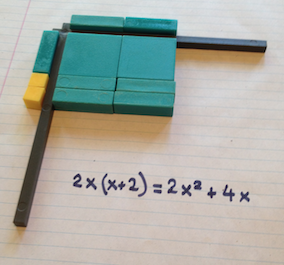Summer is here, pretty much. For most of you this means a chance to slow down, recharge, and take a break from the hectic pace of the school year. For me, summer includes some intense work, as I prepare for and present my summer workshops. This is probably my last newsletter until September.
Enjoy your time off!

Workshop news: An anonymous donor has offered to help subsidize the tuition of public school teachers who sign up for my Seattle workshops. A few scholarships are left. Read more about my workshops at the end of this newsletter, and even more on my Web site.
Blog Posts
Here are links to posts on my Math Education Blog that you might find interesting.
If you are so moved, you may comment on the posts, and/or subscribe to the blog.
Mapping Out a Course
If you are planning on refining or rethinking a course outline this summer, I suggest that the first step is to look critically at your list of topics, and see if it can be shortened. Teaching too many topics forces us to rush, and almost guarantees that students will not have a chance to develop an in-depth understanding of the topics. I wrote about this, and suggested some guidelines for pruning the curriculum here.
This is not mostly a matter of completely eliminating items: the bigger and more challenging part of the job is shifting emphasis, and deciding to give more or less time to various concepts and techniques. One thing that makes this challenging is that as we think about these shifts, the current technological landscape cannot be ignored. On the other hand, acknowledging it can trigger inexplicably emotional reactions among colleagues, administrators, and parents.
In any case, once you have thinned out your list of topics, of course, you still have to organize them into a meaningful sequence. I suggest a strategy in this post.
About Hints
As a teacher, do you believe in being the sage on the stage, or the guide on the side? This is one of those classic counterpositions to which I strenuously object. The first approach, alone, does not work: students just cannot hear answers to questions they don't have. Some teachers overreact to that truth, and believe in not giving any help, because they fear students will be robbed of agency or opportunities for discovery.
My view is that skillful teaching requires constant navigation between "the stage" and "the side". When doing that, one can make poor judgment calls, and overshoot one way or the other, but the bigger mistake is to stay at one extreme. I wrote more about this, in response to a discussion on Twitter, here.
Useful Math Education Research!
Peter Liljedahl is a math ed professor at Simon Fraser University in British Columbia. He is interested in helping teachers create what he calls a "thinking classroom," as contrasted of course with a classroom where the main objective is memorization. His findings lead to concrete ideas on how to make some useful changes, and moreover, they confirm many of my practices!
I blogged about two of his papers. In the first, he argues for grouping students randomly. In the second, he makes eight other suggestions that help attain, maintain, and reinforce a thinking classroom culture. Read my summaries, and then read the papers!
Escape from the Textbook?
Some years ago, I launched a teacher collaboration network which sponsored meetings of like-minded teachers in the Bay Area, and some online exchanges. The group was called Escape from the Textbook!, and was great while it lasted. Unfortunately, it did not last. I wrote about its briefly successful stint here, and suggested an online alternative: the #MTBoS.
NCTM Reports
Speaking of escaping the textbook: at the recent NCTM meeting in Boston, Geoff Krall presented ideas on how to improve the problems in textbooks. I shared six of his ideas here.
Brent Ferguson gave a talk about compass and straightedge construction of various numbers. This included a new-to-me construction of the trisection of a line segment. Read about this and two other workshops here.
MathEducation.page
New on my Web site.
I made some changes to my front page, which hopefully will make it easier to find things.
I also added three new pages:
Lab Gear Slides / Animations
Invariably, when I make a presentation about the Lab Gear, people want copies of my slides, which include some cool animations. However, since those are created in Keynote, and many teachers don't have access to that software, I haven't been able to share those broadly.
Luckily, it is now possible to export from Keynote to HTML, so I started that process. Check out the results here. I'll add more slides as time allows.
Exponential Functions
This is a new page, but it includes an old classic: Rolling Dice, a very effective anchor activity for exponential functions. (In fact, so effective that it appeared as another teacher's "Favorite Lesson" in The Mathematics Teacher. Read the story in my post about curriculum ripples.)
What is new: a largely visual lesson about exponential functions and their graphs, and an activity for teachers that establishes that all exponential graphs are similar. Check it out here.
Kinesthetics
My kinesthetics page was getting too long, so I broke it up into separate pages, one per activity, more or less. What made it too long was that I wanted to add a version of a great kinesthetic introduction to complex numbers which I learned at NCTM from Michael Pershan and Max Ray. The launch page to all the kinesthetic activities on my site is here.
Well, almost all the kinesthetic activities. For one more, see my Abstract Algebra unit (bottom of page 2 in the Teacher Notes.)
